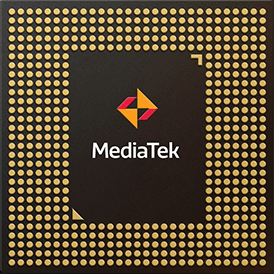
MediaTek MT8173 Benchmark, Test and specs
Last updated:
The MediaTek MT8173 has 4 CPU cores and can process 4 threads at the same time. The processor was presented in Q1/2015 and is based on the 1. Generation of the Mediatek MT-Serie series. In the Geekbench 5 benchmark, the MediaTek MT8173 achieved a result of 331 points (single-core) or 768 points (multi-core).

| Name: | MediaTek MT8173 |
|---|---|
| Family: | Mediatek MT-Serie (72) |
| CPU group: | MediaTek MT81xx MT86xx A72 / A53 (3) |
| Architecture: | Cortex-A72 / Cortex-A53 |
| Segment: | Mobile |
| Generation: | 1 |
| Predecessor: | -- |
| Successor: | -- |
CPU Cores and Base Frequency
The MediaTek MT8173 has 4 cores. The clock frequency of the MediaTek MT8173 is 1.80 GHz. An initial performance assessment can be made using the number of CPU cores.
| CPU Cores / Threads: | 4 / 4 |
|---|---|
| Core architecture: | hybrid (big.LITTLE) |
| A-Core: | 2x Cortex-A72 |
| B-Core: | 2x Cortex-A53 |
| Hyperthreading / SMT: | No |
|---|---|
| Overclocking: | No |
| A-Core Frequency: | 1.80 GHz |
| B-Core Frequency: | 1.40 GHz |
Internal Graphics
The MediaTek MT8173 has an integrated graphics that the system can use to efficiently play back videos. The MediaTek MT8173 has the PowerVR GX6250 installed, which has 2 streaming multiprocessors (32 shaders).
| GPU name: | PowerVR GX6250 |
|---|---|
| GPU frequency: | 0.70 GHz |
| GPU (Turbo): | 0.70 GHz |
| Compute units: | 2 |
| Shader: | 32 |
| Hardware Raytracing: | No |
| Release date: | Q1/2014 |
| Max. displays: | 1 |
|---|---|
| Generation: | -- |
| Direct X: | 10 |
| Technology: | 28 nm |
| Max. GPU Memory: | -- |
| Frame Generation: | No |
Memory & PCIeThe MediaTek MT8173 supports a maximum of 2 GB memory. Depending on the mainboard, the processor can use a maximum of 2 (Dual Channel) memory channels. This results in a maximum bandwidth of the main memory of 14.9 GB/s. |
|
| Memory type: | Memory bandwidth: |
|---|---|
| LPDDR3-933 | 14.9 GB/s |
| Max. Memory: | 2 GB |
| Memory channels: | 2 (Dual Channel) |
| ECC: | No |
| PCIe: | |
| PCIe Bandwidth: | -- |
Thermal ManagementThe MediaTek MT8173 has a TDP of . Based on the TDP, the system manufacturer can and must adapt the cooling solution to the processor. |
|
|---|---|
| TDP (PL1 / PBP): | |
| TDP (PL2): | -- |
| TDP up: | -- |
| TDP down: | -- |
| Tjunction max.: | -- |
Technical details
Modern production reduces the waste heat of a processor and increases its efficiency. The MediaTek MT8173 is made in 28 nm and has 0.00 MB cache.
| Technology: | 28 nm |
|---|---|
| Chip design: | Chiplet |
| Socket: | -- |
| L2-Cache: | -- |
| L3-Cache: | -- |
| AES-NI: | No |
| Operating systems: | Android |
| Virtualization: | None |
|---|---|
| Instruction set (ISA): | Armv8-A (64 bit) |
| ISA extensions: | -- |
| Release date: | Q1/2015 |
| Release price: | -- |
| Part Number: | -- |
| Documents: | Technical data sheet |
Rate this processor
Benchmark results

The benchmark results for the MediaTek MT8173 have been carefully checked by us. We only publish benchmark results that have been created by us or that have been submitted by a visitor and then checked by a team member. All results are based on and fullfill our benchmark guidelines.
Geekbench 5, 64bit (Single-Core)
Geekbench 5 is a cross plattform benchmark that heavily uses the systems memory. A fast memory will push the result a lot. The single-core test only uses one CPU core, the amount of cores or hyperthreading ability doesn't count.

|
Qualcomm Snapdragon 670
8C 8T @ 2.00 GHz |
||

|
Intel Atom C3538
4C 4T @ 2.10 GHz |
||

|
Intel Atom C3958
16C 16T @ 2.00 GHz |
||
|
|
MediaTek MT8173
4C 4T @ 1.80 GHz |
||

|
Intel Pentium E2220
2C 2T @ 2.40 GHz |
||

|
AMD Athlon II X3 425
3C 3T @ 2.70 GHz |
||

|
AMD Athlon II X4 615e
4C 4T @ 2.50 GHz |
||
Geekbench 5, 64bit (Multi-Core)
Geekbench 5 is a cross plattform benchmark that heavily uses the systems memory. A fast memory will push the result a lot. The multi-core test involves all CPU cores and taks a big advantage of hyperthreading.

|
Intel Celeron N4000
2C 2T @ 2.60 GHz |
||

|
Intel Pentium N3700
4C 4T @ 2.40 GHz |
||

|
MediaTek MT6752M
8C 8T @ 1.50 GHz |
||
|
|
MediaTek MT8173
4C 4T @ 1.80 GHz |
||

|
UNISOC SC9863A
8C 8T @ 1.20 GHz |
||

|
AMD Athlon II X2 250e
2C 2T @ 3.00 GHz |
||

|
AMD Phenom II X2 555
2C 2T @ 3.20 GHz |
||
Geekbench 6 (Single-Core)
Geekbench 6 is a benchmark for modern computers, notebooks and smartphones. What is new is an optimized utilization of newer CPU architectures, e.g. based on the big.LITTLE concept and combining CPU cores of different sizes. The single-core benchmark only evaluates the performance of the fastest CPU core, the number of CPU cores in a processor is irrelevant here.

|
Intel Core i3-2310M
2C 4T @ 2.10 GHz |
||

|
Intel Core i3-2312M
2C 4T @ 2.10 GHz |
||

|
Qualcomm Snapdragon 660 non LTE
8C 8T @ 2.20 GHz |
||
|
|
MediaTek MT8173
4C 4T @ 1.80 GHz |
||
|
|
HiSilicon Kirin 710
8C 8T @ 2.20 GHz |
||

|
Intel Pentium B940
2C 2T @ 2.00 GHz |
||

|
Intel Celeron J4115
4C 4T @ 2.50 GHz |
||
Geekbench 6 (Multi-Core)
Geekbench 6 is a benchmark for modern computers, notebooks and smartphones. What is new is an optimized utilization of newer CPU architectures, e.g. based on the big.LITTLE concept and combining CPU cores of different sizes. The multi-core benchmark evaluates the performance of all of the processor's CPU cores. Virtual thread improvements such as AMD SMT or Intel's Hyper-Threading have a positive impact on the benchmark result.

|
Intel Celeron N4000C
2C 2T @ 2.60 GHz |
||

|
Intel Pentium B940
2C 2T @ 2.00 GHz |
||

|
Intel Pentium E6600
2C 2T @ 3.06 GHz |
||
|
|
MediaTek MT8173
4C 4T @ 1.80 GHz |
||

|
Intel Pentium N3530
4C 4T @ 2.58 GHz |
||

|
Intel Celeron 1005M
2C 2T @ 1.90 GHz |
||

|
Intel Atom x7-Z8750
4C 4T @ 2.56 GHz |
||
iGPU - FP32 Performance (Single-precision GFLOPS)
The theoretical computing performance of the internal graphics unit of the processor with simple accuracy (32 bit) in GFLOPS. GFLOPS indicates how many billion floating point operations the iGPU can perform per second.

|
AMD E1-6010
AMD Radeon R2 (Beema) @ 0.35 GHz |
||

|
AMD E1 Micro-6200T
AMD Radeon R2 (Beema) @ 0.35 GHz |
||

|
AMD E2-7015
AMD Radeon R2 (Beema) @ 0.35 GHz |
||
|
|
MediaTek MT8173
PowerVR GX6250 @ 0.70 GHz |
||

|
MediaTek Helio X10
PowerVR G6200 @ 0.70 GHz |
||

|
MediaTek MT8183
ARM Mali-G72 MP3 @ 0.80 GHz |
||

|
MediaTek Kompanio 500
ARM Mali-G72 MP3 @ 0.80 GHz |
||
Estimated results for PassMark CPU Mark
Some of the CPUs listed below have been benchmarked by CPU-monkey. However the majority of CPUs have not been tested and the results have been estimated by a CPU-monkey’s secret proprietary formula. As such they do not accurately reflect the actual Passmark CPU mark values and are not endorsed by PassMark Software Pty Ltd.

|
Intel Pentium T2410
2C 2T @ 2.00 GHz |
||

|
Intel Atom Z3740D
4C 4T @ 1.33 GHz |
||

|
Intel Celeron N3000
2C 2T @ 2.08 GHz |
||
|
|
MediaTek MT8173
4C 4T @ 1.80 GHz |
||

|
Intel Pentium T2390
2C 2T @ 1.86 GHz |
||

|
Intel Celeron J1750
2C 2T @ 2.41 GHz |
||

|
Intel Celeron J1800
2C 2T @ 2.58 GHz |
||
Benchmarks

Geekbench 5 (SC)
2,488 entries
2,488 entries

Geekbench 5 (MC)
2,461 entries
2,461 entries

Geekbench 6 (SC)
1,755 entries
1,755 entries

Geekbench 6 (MC)
1,703 entries
1,703 entries

FP32 SP (iGPU)
2,042 entries
2,042 entries

PassMark CPU-Mark
2,392 entries
2,392 entries
Popular comparisons
back to index








